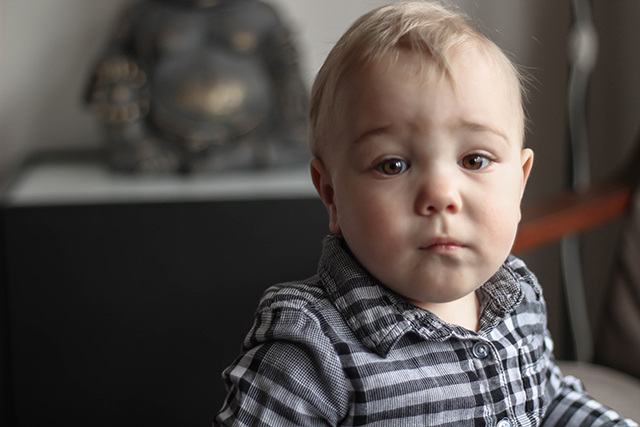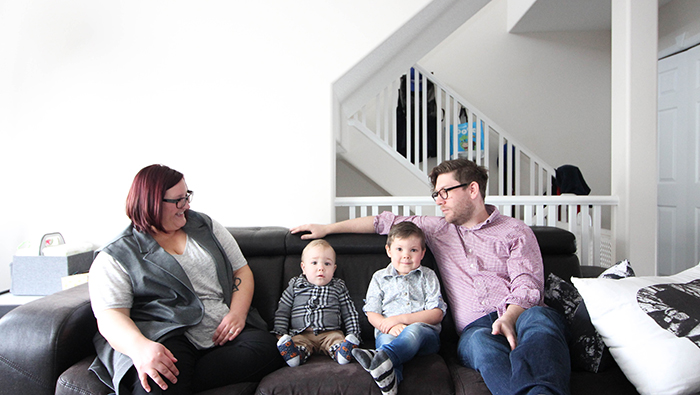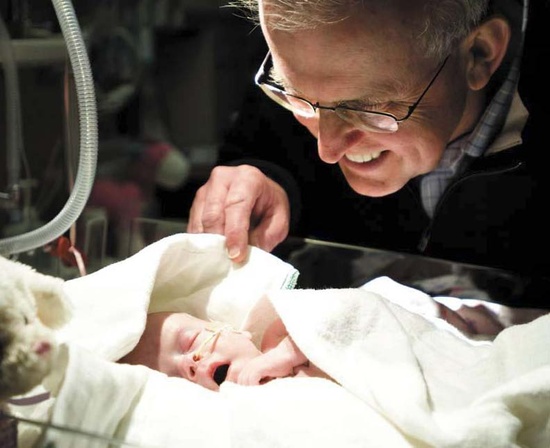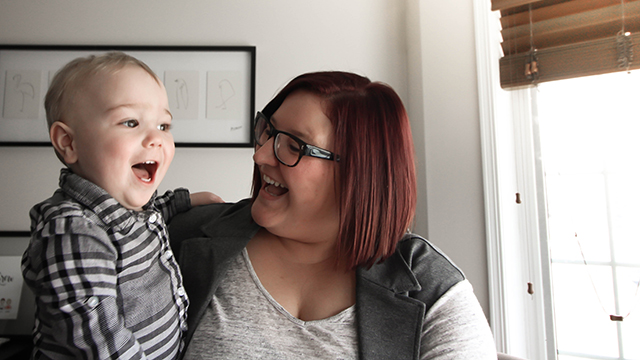
The unexpectedly early birth of Coen Bauld prompted his parents to help prevent preterm births. (Photos: Melissa Fabrizio)
Katrina Dickie-Bauld and her husband Sheldon Bauld were having a fairly uneventful pregnancy for their second child. One Saturday, three months away from their due date, something didn't feel right for Katrina. Hours later, she was giving birth to their son, Coen.
"I was not feeling great, so we decided to go to the hospital just to check if everything was fine," said Katrina. "My doctor, who had seen me all throughout my pregnancy, told us we were in labour. It was pretty scary."
After two stressful and emotional months in intensive care, the Baulds were able to take their baby boy home. This same story has been lived by many couples in Canada who have unexpected premature births, and some don't get to have the positive outcome of a healthy baby. Preterm birth accounts for two-thirds of infant deaths in Canada. Each year, an estimated 390,000 babies are born in Canada, nearly eight per cent are born prematurely and the cause of the majority of these preterm births is unknown. Premature babies face health complications and are at higher risk of developing chronic health conditions later in life.
Hoping to help change the uncertainty in the lives of future families like them, the Baulds decided to use their son's first birthday party as an opportunity to raise funds to support the University of Alberta's research efforts for better prediction and prevention of preterm births.
The uncertainty of a preemie's first days
After going into labour, there was only time for a brief meeting with a neonatologist about the possible risks for Coen's health in this situation, and the delivery happened quickly afterwards.
"We weren't really ready for something like that," said Sheldon, remembering their journey.
"We had gone over the risks and what we could expect, and there were some big, scary risks," said Katrina.
Premature babies are at high risk of having brain hemorrhage or contracting infections that could be fatal. In the case of very early births, babies' lungs are not fully developed to breathe efficiently and oxygenate blood. Preemies are at risk of developing bronchopulmonary dysplasia, a disease that can cause lung damage or long-term dependence on supplemental oxygen.
Coen weighed two pounds at birth, which was the expected weight for him at 28 weeks into the pregnancy.
A few hours later, the Baulds were able to see their son. He was being cared for in a 'pod' at the Royal Alexandra Hospital's neonatal intensive care unit (NICU), among many other babies also fighting for their lives. Coen would have to stay there for more than eight weeks because his lungs weren't ready to breathe normally yet.
"It's crazy in there," said Sheldon. "There are 'tiers' of intensive care. We were in the first one, in the highest level of hands-on care."
Sheldon had to return to work shortly after and saw Coen every evening, and Katrina was at the NICU for eight hours every day.
Katrina says their time in the NICU was a marathon of critical moments as Coen 'forgot' to breathe frequently and his heart rate dropped suddenly, triggering alarms that would bring nurses rushing in to help him breathe.
"Watching nurses come to revive your baby every 10 minutes for an eight-hour stretch… I can't tell you what that does to you," remembered Katrina with tears. "As a mother, you're just sitting there next to your baby who's hooked up to all those machines. It's heartbreaking and the most helpless feeling. It's horrible and I don't want anyone else to have to go through that."

Katrina, Coen, Sebastian and Sheldon Bauld
The Baulds consider themselves lucky because Coen didn't face as many complications as other babies in the NICU. After 59 days, they were able to take Coen home to join his older brother Sebastian.
The Baulds were familiar with the work of David Olson, professor and researcher in the Department of Obstetrics and Gynecology at the U of A's Faculty of Medicine & Dentistry and the Women and Children's Health Research Institute (WCHRI). They decided to raise funds for UAlberta preterm birth research at Coen's first birthday party-instead of presents, the couple asked guests for donations, and were able to raise almost $4,000.
Seeking better prediction to improve newborn outcomes
According to Olson, premature births can be influenced by a variety of factors, ranging from stress, obesity and even a mother's adverse childhood experiences, to external factors like urbanization and environmental conditions. However, the cause of the majority of preterm births remains unknown. Even when the most critical part of intensive care has passed, being a preemie can have a long-term impact on a person's life like learning disabilities, eyesight problems, mental health issues and a high proclivity to develop other diseases later in life.
Governments are gradually becoming more aware of the impact of preterm birth, its social and financial stress on families, and the higher costs it entails for the health-care system and education. Recently, the Government of Canada invested $6.45 million through the Canadian Institutes of Health Research (CIHR) to support the advancement of preterm birth research and improvement of health outcomes for premature babies. UAlberta's Silvia Pagliardini, Department of Physiology, was one of the recipients of this funding.
The money raised by the Baulds helped further Olson's precision health project to develop a preterm delivery test that can predict if a woman will go into labour within seven days. This could give valuable time to obstetricians to plan a treatment that delays the labour stage before it starts. The test is in the late stages of the patenting process and Olson's team is currently working on ways to make sure it can be adapted for easy use in clinics.

Professor and researcher David Olson
"What is special about our test is that it identifies women at risk who are otherwise asymptomatic, or without any clinical signs of going into labour," said Olson. "In the past, physicians would identify preterm birth with the clinical signs and treat the women with drugs known as tocolytics, designed to stop the contractions of the uterus. These drugs were not very effective mostly because the labour had already begun and all they were trying to do was stop one part of it. It was like trying to stop a locomotive that had already started its engine and was moving down the track."
This innovative test is part of several projects that Olson is driving to complement each other in the process of preventing premature births. His research also looks at determining factors of risk for women to have a preterm delivery and classify them according to risk level early on in the pregnancy-so they can follow up with the test on women at high risk to determine when they are closer to be in labour-and the development of new drugs that can safely block the labour stage before it is too late.
"It's like the motor of the engine is on, but the train is standing still. What these new, effective, safe and inexpensive drugs would do is 'turn the key off' so the locomotive's engine stops and it can't go anywhere."
Olson and his team's research has been funded by the Stollery Children's Hospital Foundation and generous supporters of the Lois Hole Hospital for Women through the Women and Children's Health Research Institute (WCHRI). They have also received funding from the Canadian Institutes of Health Research as well as international grants from China, Australia and the government of the United States.

Olson says he is very grateful for the support received through the Baulds' fundraising effort. "It's very unique. Instead of giving birthday presents to Coen, they gave a gift of financial support to the university. Thanks to this we were able to advance the project of our test, and support one of the graduate students who works with us too and our team has made significant progress."
"People within our age group and with young families don't always have the resources to donate much money," said Sheldon Bauld. "When you get to a stage in your life when you can donate, this stuff is kind of long gone or there are other issues taking your time. There isn't much funded research for preemies so we decided we wanted to do something now."
Katrina agrees. "Not every premature birth may be preventable, but if we can prevent one per cent of them it's more than worthwhile."
"This is a wonderful example that any donation counts for us," explained Olson. "They all add up. The friends and family of a baby like Coen Bauld, they all made a significant difference. While research is very expensive, you can get much done with support."